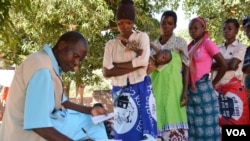While health workers fighting the coronavirus around the world have been cheered in public, in Malawi they complain of insults, stigma, and discrimination.
Malawi so far has confirmed 33 cases of COVID-19 and three deaths. But health workers say they are presumed to carry the virus, shunned in public, refused access to public transport, and even evicted from rented homes.
The mayor of Malawi’s capital, Lilongwe, recently condemned the practice of shunning health care workers for fears they have COVID-19.
Juliana Kaduya asked members of the public to appreciate what these workers are doing in saving the lives of coronavirus patients.
But a nurse at Kamuzu Central Hospital in Lilongwe, who requested not to be named for fear of reprisals, told VOA the abuse continues. She said in a telephone interview that some passengers blocked her as she tried to climb aboard a minibus on her way to work Tuesday.
“When I was boarding a minibus, a female passenger charged at me saying, ‘These are the ones who are carrying Ebola,’ instead of saying coronavirus and ‘They should not come in here.’”
The nurse said the confrontation forced her to take a taxi to work.
The National Organization for Nurses and Midwives of Malawi says it has received several complaints and video clips about minibus operators not allowing nurses to board their vehicles. Its president, Charles Simeza, speaking to VOA, said that in some cases the discrimination has gone much farther.
“Even some landlords have vacated (evicted) the health workers that are renting their houses to say, ‘No you can’t be in my house, you guys are infected, so, you will infect my house.’ We have received those grievances, and we have decried [them]… It’s unfair,’” Simeza said.
Last week, a local online publication ran a story about a community in southern Malawi threatening to evict or even kill a health worker who handled a patient later found to have tested positive for COVID-19, the disease caused by the coronavirus. The fear was that the health worker was also infected and posed a danger to the whole area.
Simeza said some health facilities have responded to the complaints by arranging for special vehicles to transport their medical staff.
Health workers like the nurse who spoke to VOA on condition of anonymity have resolved to put on civilian gear whenever they travel by public transport.
“We are now carrying our uniforms in the bags. You can’t see a nurse boarding a minibus in uniform. You even can’t see a nurse walking in public in uniform to catch a bus,” she said.
Health ministry spokesperson Joshua Malango declined to comment on the matter Thursday, saying the ministry has yet to receive official complaints from medical workers.
Meanwhile, health workers in Malawi’s public hospitals are holding sit-ins, pushing the government to provide them with personal protective equipment – a move they believe would also help reduce suspicions that they are carriers of COVID-19.




